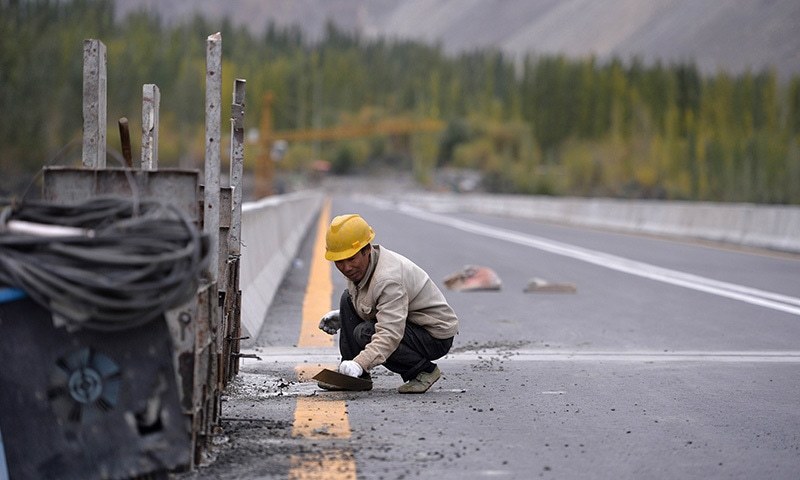
In recent weeks, one issue which has been in the news for a variety of reasons is the China-Pakistan Economic Corridor (CPEC). The 3,000 kilometer corridor not only will help Pakistan in dealing with its energy crisis, but also will strengthen connectivity and infrastructure within the country and give a strong boost to its economy. However, the project has faced opposition, both externally and internally.
India has raised serious objections to the project, especially regarding the fact that some of these projects are being implemented in parts of Pakistan Administered Kashmir (PAK). Both Pakistan and China have given rebuttals to India’s objections. Huang Xilian, Deputy Director General of Asian Affairs at the Chinese Foreign Ministry, while dismissing India’s objections to the project, stated “We know the concern of the Indian side and those projects are not political projects. They are all for livelihood of people. There is no commercial action by China in that part of the region.”
India lodged a protest with the Chinese Ambassador in India, while India’s Ambassador in China also raised the issue on the eve of the Indian PM’s China visit. PM Modi also raised this issue during his visit to Beijing.
Indian Foreign Minister, Sushma Swaraj put forth India’s objections to the project during a press conference, highlighting the fact that India had already expressed its apprehensions to China. Swaraj said, “We lodged a protest calling the Chinese ambassador. We lodged a protest through our Ambassador there (Beijing). And when the Prime Minister had gone there (to China), he talked about it very firmly. He raised it very strongly that it is not acceptable to us what you are talking about China-Pakistan economic corridor going to PoK.” Pakistani Prime Minister Nawaz Sharif has rejected India’s objections, pointing to the Chinese response. Sharif said, “I want to inform you that China has already rejected the objections.” Pakistan’s Foreign office too has dismissed India’s concerns stating that the project will not just benefit Pakistan, but the whole region.
In the midst of an exchange of heated words between India and Pakistan, what is perhaps overlooked is the fact that there is a strong lobby in Pakistan which is also opposing the corridor. There are strong objections to the project from provinces other than Punjab and Sindh – Khyber Pakhtunkhwa and Balochistan – that believe that Punjab is the biggest beneficiary.
Federal Minister for Planning, Development and Reforms, Ahsan Iqbal sought to allay the fears of other provinces and said that objections to the project were pushing away Chinese investors. Iqbal, during a workshop at the National Defence University, Islamabad, also stated that over 60% of the total production of 13,880 megawatt from the project would go to Balochistan and Sindh, so there is no question of them being left out. Iqbal asserted that these two provinces would in fact be the biggest beneficiaries of the project.
Scholars and business lobbies in Pakistan too have serious apprehensions vis-à-vis the project. Business lobbies believe that this project will benefit China more than Pakistan. They believe that by dumping Chinese goods in Pakistan, the former has benefited more from the economic relationship already. An article in Dawn quotes a prominent businessman, Razzak Dewan in this context: “Infrastructure takes time to develop, but our immediate worry is dumping of goods by Chinese companies in Pakistan, driving people out of business. Something should be done to check the trend.”
In an article written for The Express Tribune, a Pakistani analyst succinctly sums up his write-up by highlighting that Pakistan needs to be more pragmatic with regard to the project and not get carried away. Ali Salman, Executive Director of PRIME Institute, Islamabad says:
“China needs us. Pakistan should embrace this huge opportunity with a pragmatic, and business-like cost-benefit analysis instead of confounding this transaction with metaphors of oceans, mountains, honey and now iron. It’s about hard cash which the finance minister badly needs for the country. We should not leave too much cash on the Chinese Wall.”
In addition to sections of Pakistan’s political class and business community, more than one scholar has raised concerns regarding the leverage which this project will give the Chinese vis-à-vis Pakistan. The skepticism stems from fears of domination by yet another external power, with Pakistan already having suffered from such a situation in the past.
India, for its part, needs to start paying closer attention to the resentment which is brewing against China in Pakistan. It is true that the anti-China sentiment will not necessarily translate into pro-India sentiment and relations between Pakistan and India are far from normal. Yet, PM Modi, who is trying to improve ties with other neighbors by reaching out and addressing some of their legitimate concerns, would do well to address the major economic issues, especially tariff and non-tariff barriers that hamper bilateral trade. While it is not easy to do, or to delink this from other issues, it requires statesmanship. Some significant steps were taken during the Manmohan Singh government, largely due to the former PM’s sound vision and strong convictions in the context of regional integration. By genuinely addressing some of the valid concerns of the business community of Pakistan, India will send a clear message that it is keen to build a strong economic partnership free of platitudes but high on substance.
***
Image: Aamir Qureshi-AFP, Getty


